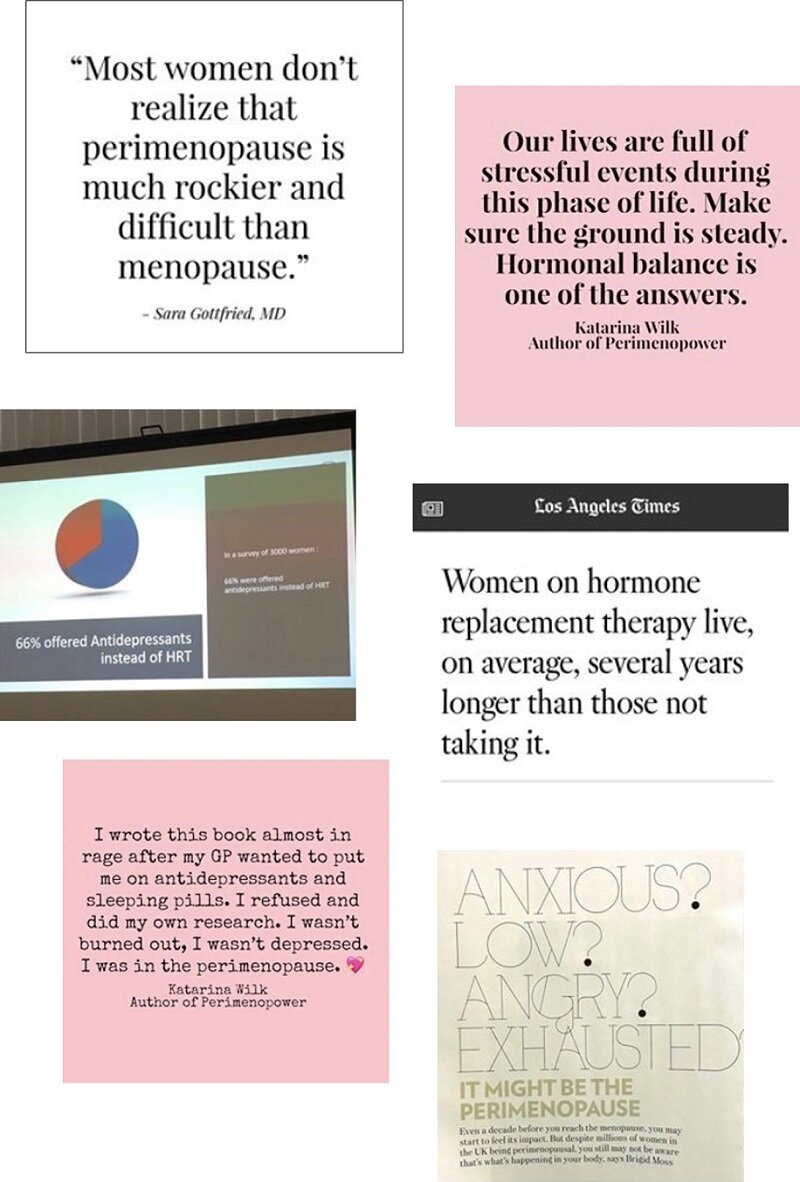"But, I’m only in my 40s!" Welcome to Perimenopause.
I’m back to talk perimenopause and menopause. Today is mainly for those of you in your 40s and early 50s who just might be in denial about what is happening to your beautiful body…Because the majority of Americans are women, and the majority of those women are between the ages of 45-60, and this demographic represents the majority of my clients, perimenopause and menopause are two topics I raise often. The most common responses I hear, typically conveyed with consternation or embarrassment:
“Oh, I’m not there yet.”
“I’m still getting my period.”
“I will never take estrogen.”
“Oh…I’m fine.”
Welcome to being a wellness professional who listens to countless women who struggle with their weight, their emotions, their anxiety, and understands how all of this takes a toll on their self-confidence. Welcome to my world of watching so many women live with so much anxiety and worry, which, due to hormonal changes that are out of your control, just get worse in your late 30s and 40s. My hope today is that you are no longer embarrassed about the process of perimenopause and menopause, seek the counsel of a specialist who is a member of the esteemed North American Menopause Society, and dive into how you can live an even more vital life.So let’s begin by looking at what is really going on in your body, starting in your 30s and progressing into your 40s.Each month, the brain talks to the ovaries and signals the body to produce estrogen, testosterone, and progesterone for the sole purpose of procreation. As we age, the process of ovulation begins to slow and become erratic. Your eggs are beginning their long phase of “retirement,” causing what may seem like mild symptoms that you don’t even recognize as part of this process. Welcome to perimenopause and menopause and its toughest symptoms. The top five symptoms are below, the combination of which adds up to major stress:
My hope today is that you are no longer embarrassed about the process of perimenopause and menopause, seek the counsel of a specialist who is a member of the esteemed North American Menopause Society, and dive into how you can live an even more vital life.So let’s begin by looking at what is really going on in your body, starting in your 30s and progressing into your 40s.Each month, the brain talks to the ovaries and signals the body to produce estrogen, testosterone, and progesterone for the sole purpose of procreation. As we age, the process of ovulation begins to slow and become erratic. Your eggs are beginning their long phase of “retirement,” causing what may seem like mild symptoms that you don’t even recognize as part of this process. Welcome to perimenopause and menopause and its toughest symptoms. The top five symptoms are below, the combination of which adds up to major stress:
Mood changes
Sleep disruptions
Hot flashes (or night sweats)
Weight gain around the mid-section
Loss of muscle mass
So, yes, while you still have a monthly cycle, this process the body is designed to do slows down, causing the brain to be frustrated and fight you. The ovaries can still make estrogen and progesterone, yet not reliably and not the right quantity. So, yes, you can get pregnant. This process lasts on average 4-8 years.As we age and progress into menopause, most menopause professionals suspect that declining estrogen levels may lower the rate of energy used during exercise. Additionally, weight loss and wellness habits and workout routines you employed in younger years often aren’t as effective. So, it takes a lot more work to lose weight. Not achieving your desired results within a certain time frame often increases frustration and decreases motivation.Declining estrogen levels wreak hormonal havoc that can cause night sweats and sleepless nights. Sleep deprivation produces increased levels of ghrelin, the hunger hormone, and decreased levels of leptin, the “stop eating” hormone. This can also hasten the weight gain cycle.So, what to do? Let’s go back to Part 1 where I suggest that this is a time in our lives where we can reset and reclaim, take stock, and make bold changes for what YOU want, not the many individuals for whom you care. My call to action -- my top priority for you -- is to get on top of your stress before the symptoms of perimenopause and menopause get the best of you.After perimenopause comes her close cousin, menopause. Stay tuned for my next article on menopause and the beautiful opportunity you have to look at the next half of your life with open eyes and deep knowledge about your body and its capacity for anything – really!And, as always, I’m happy to chat it up with you about what you’re experiencing, my journey, and my referral network of experts. Email me at contact@fitnessontherun.net for a FREE 30-minute consult.